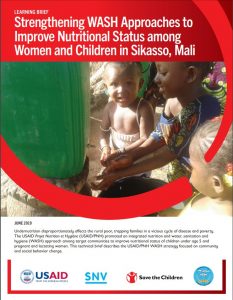
Under nutrition disproportionately affects the rural poor, trapping families in a vicious cycle of disease and poverty.
The USAID Projet Nutrition et Hygiène (USAID/PNH) promoted an integrated nutrition and water, sanitation and hygiene (WASH) approach among target communities to improve nutritional status of children under age 5 and pregnant and lactating women in Mali. This technical brief describes the USAID/PNH WASH strategy focused on community and social behavior change in the country.
Save the Children organized the project’s WASH component around the concept of clean household model coupled with support for the government’s community-led total sanitation (CLTS) effort. CLTS is a participatory rural appraisal technique that engages communities to solve their own problems by using community decision-making and social solidarity to influence individual behavior and achieve results.
This facilitated process inspires rural community members to analyze their traditional practice of open defecation, to discuss why it happens, to understand the consequences to their health and to collectively abandon the practice of open defecation and build latrines without any outside subsidy.